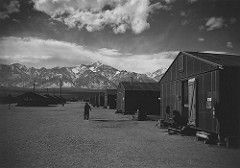
President Donald Trump
Only Penguins Look Alike
Internment camps are still a bad idea.
Posted November 19, 2016

Being mistaken for someone else is a common experience for people of color. Research tells us that we are better at telling people apart in our own group than in other groups. People outside our group may “all look alike” because we have limited experience with them. But as the first Asian American President of the American Psychological Association Richard Suinn once said, “only penguins look alike.”
Looking like someone else caused my mother to be imprisoned when she was 20 years old. During World War II, the United States government placed her and 120,000 other Japanese Americans in internment camps because they looked like the enemy. She had never been to Japan and was born in the United States, like two-thirds of the people who were interned. President Franklin D. Roosevelt signed Executive Order 9066 authorizing the internment camps as a “military necessity” to protect against espionage and sabotage. Although the United States also was at war with Germany and Italy, there was no mass imprisonment of German Americans or Italian Americans. Internment camps caused immense harm to the people and families who were affected, not to mention to the United States’ rejection of its cherished value of imprisonment without trial. And they were flat-out racial profiling.

What danger did Japanese Americans during World War II actually pose? Half the people in the internment camps were children. There is no evidence that any Japanese Americans committed espionage or sabotage before or during World War II. And if they were so dangerous, why were Japanese American men recruited from the camps to join the United States Army 442nd Infantry Regimental Combat Team? While my uncle and other members of the 442nd fought for our country in Europe, his younger siblings and parents were in Poston, Arizona in an internment camp.
It has been 70 years since the internment camps closed. Will history repeat itself? On Fox News, Donald Trump supporter Carl Higbee recently called the World War II internment camps a precedent for creating registries of Muslim Americans. Registries could identify people suspected of being terrorists. Given that White males commit most mass shootings and rapes in the United States, a satirical White male registry has been proposed. Violating civil rights with registries or internment camps is absurd for any group. Simply looking like someone who may be dangerous does not make a person dangerous. Only penguins look alike.
References
Kaspar, K. (2016). Culture, group membership, and face recognition. Commentary: Will you remember me? Cultural differences in own-group face recognition biases. Frontiers in Psychology, 7.
Nagata, D. K. (1993). Legacy of injustice: Exploring the cross-generational impact of the Japanese American internment. New York: Plenum Press.

